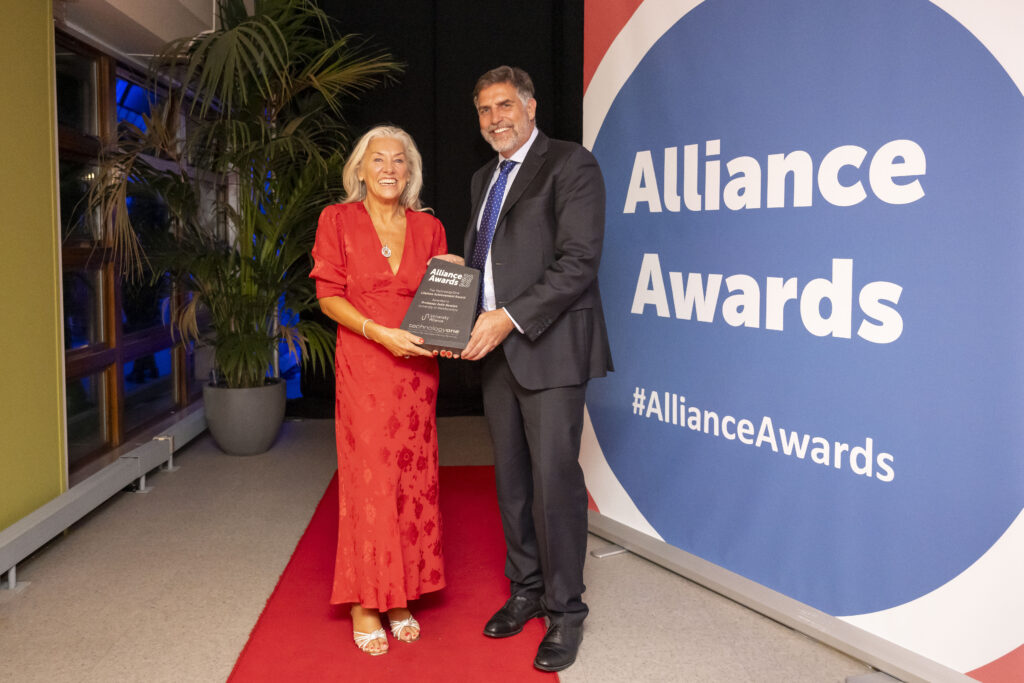Collaboration and connectivity must be top priorities for universities and funders if the UK is to continue to lead the world in research and innovation, a new report from University Alliance concludes.
Britain’s research and innovation ecosystem is a national success story. But increased global competition means that for it to continue to flourish it will need greater collaboration and more effective connections with different partners – within academia and with businesses, charities and governments.
A new report published today by University Alliance sets out for the first time what is needed to future proof Britain’s research ecosystem, in particular the need for greater collaboration and connectivity. In response to this, Alliance universities are working collaboratively to deliver a new doctoral training scheme. The Doctoral Training Alliance will be built around joint research strengths and embed close relationships with industry from design to delivery.
The report, Evolve. Connect. Succeed. Funding a healthy research and innovation ecosystem, establishes four key findings. The UK’s research ecosystem must be:
- selective so we continue to develop world-leading expertise,
- collaborative to maximise complementary strengths,
- responsive and relevant to the rest of society and industry,
- committed to nurturing future capability.
Alliance universities have these characteristics built into their DNA, demonstrating particular strengths that are well-suited to meet today’s challenges.
The report concludes that continued and sustained investment is central to the success of the research and innovation ecosystem.
Maddalaine Ansell, Chief Executive of University Alliance, said:
“This is an important report. A world-class research and innovation ecosystem is critical to the UK’s competitiveness and well-being.
“The challenge is to ensure it remains excellent through responding and adapting to fast-paced change and increased competition. This requires not only continued investment in universities but also efficient and effective use of the existing excellence and capability in the system.
“Alliance universities understand this. They are working collaboratively to deliver a new doctoral training system. This shows our commitment to maintaining the pipeline of researchers with relevant skills for the research ecosystem of the future. The Doctoral Training Alliance will be built around joint research strengths and embed close relationships with industry from design to delivery.”
Professor Steve West, Chair of University Alliance and Vice-Chancellor of the University of the West of England Bristol, said:
“The UK has a smart way of funding research. Identifying where excellent research exists and then funding it ensures we have a strong research ecosystem and are able to compete globally. We recognise that the ecosystem’s future success relies on balancing stability and dynamism. Long-term commitment to investment, distributed through our successful dual support system, is the right way to maintain this balance.
“Open competition must underpin every investment. The best research must be funded wherever it is found. In judging what is best, we need to value connectivity within the research community and with the rest of society.
“Alliance universities are essential to the research ecosystem. We have particular strengths that equip us to meet today’s challenges. The recent Research Excellence Framework (REF) saw our research power grow by 27% since 2008, and far outstrip the national average in quality improvement”.
The report will be launched at a high-profile event attended by parliamentarians, businesses and researchers in the Royal Institution, London.
University Alliance will also launch a new website resource at www.unialliance.ac.uk/research of more than 60 impact case studies submitted by our universities to the REF 2014 exercise. They showcase the excellent research happening in Alliance universities and our impact both on here in the UK and around the world. These case studies show how we are finding new ways to overcome socio-economic challenges: growing industries, improving healthcare, building sustainability and shaping society.
Together these stories provide compelling evidence that the strength and quality of the UK research and innovation ecosystem depends on the government continuing to fund excellence wherever it is found.
KEY findings and recommendations from Evolve. Connect. Succeed. Funding a healthy research and innovation ecosystem
Selectivity drives excellence
Keeping ahead of our global competitors in research and knowledge isn’t possible without selectivity. Open, competitive and peer reviewed funding allocations and a dual support system that balances stability and dynamism allow universities to invest strategically and develop the peaks of excellence that keep the UK at the forefront of global knowledge.
That’s why University Alliance is calling on decision-makers to continue to fund excellence wherever it is found through dual support and competitive funding processes.
Nurturing new talent future-proofs the system
The future excellence of our research and innovation ecosystem lives and dies on the quality of our postgraduate researchers, who are more likely to work in industry than academia on completion. We must nurture the next generation of these researchers and innovators across the full range of disciplines, using supervisors with a breadth of skills and experience, and create dynamic and innovative training environments where they can forge new connections with a wide range of partners.
That’s why University Alliance calls for public funders to support postgraduate researchers in all areas of excellence and skills, and to support universities who want to work together to deliver doctoral training schemes with enhanced opportunities for connectivity.
Alliance universities are committed to maintaining the pipeline of relevant and diverse future high level skills for the research ecosystem. Recognising the value of cohort-based learning and employer co-designed training programmes, Alliance universities are working collaboratively to deliver a new doctoral training scheme. The Doctoral Training Alliance will be built around joint research strengths and embed close relationships with industry from design to delivery.
Collaboration optimizes the system
A healthy ecosystem thrives on the mutual interdependency of those within it – silos can hold back progress, lead to duplication and promote inefficiency.
That’s why University Alliance calls for funders to encourage more collaboration through further recognition and incentivisation of joint research activities. We also want national bodies to work with universities towards an open, accessible and inclusive national asset sharing scheme to proactively share high-tech equipment and research facilities with each other and industry.
Responsiveness delivers the greatest benefit from research
Quality research delivers real world impact and return on public investment. This relies on a healthy ecosystem that can adapt and respond to a fast-changing environment. Research excellence can no longer be defined solely by its impact within academia but must prove its value for society.
That’s why University Alliance wants Funding Councils to continue to recognise and reward the role impact has in driving quality, using a case study approach to capture the diversity of impacts that can be achieved. We also want them to prioritise funding streams like Quality-Related funding and the Higher Education Innovation Fund which build in agility and responsiveness to research and knowledge exchange activities.
ENDS
Notes to Editors
All of the case studies can be found here
The report Evolve. Connect. Succeed. Funding a healthy research and innovation ecosystem can be downloaded here




